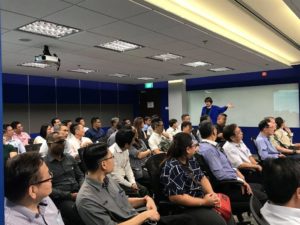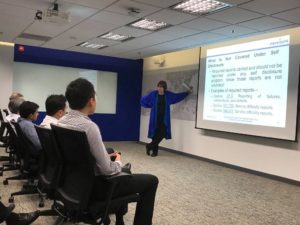ARSA Maximizes Training Time in Singapore

Sarah MacLeod speaks with SAQG workshop participants during a session in Singapore on Nov. 9. Photo courtesy SAQC.
On Nov. 9, Executive Director Sarah MacLeod conducted the Singapore Aerospace Quality Group’s (SAQG) fourth workshop, a gathering of more than 50 aviation professionals hosted in the small republic. The workshop’s participants were quality and engineering personnel representing 26 companies, most with strong international business interests.
MacLeod summarized the FAA’s efforts to overhaul its Flight Standards and Aircraft Certification organization; she also provided an overview of the agency’s designee and self-disclosure programs. The sessions closed with Sarah’s insight into the American rulemaking process, which focused participants on proactive engagement.
The SAQG is an initiative of the Association of Aerospace Industries – Singapore (AAIS) and was developed as a tool for AAIS to cultivate technically-focused professional communities. The group hosted MacLeod’s workshop to take advantage of her travel to Singapore to present regulatory training for FAA-certificated repair stations, which was administered through ARSA’s management firm Obadal, Filler, MacLeod & Klein, P.L.C.
Of the topics covered by MacLeod’s presentation, most are presented by sessions currently available on-demand from ARSA’s training program (bundle purchases available for various topics):
Self Disclosure – The Elements
This session reviews the elements of self-disclosure established by the FAA. It covers the who, what, why, when, where and how of filing a voluntary self-disclosure report with the agency. Additionally, it covers how the agency is to handle the report and its expectations for follow up actions.
Self Disclosure – How to Avoid Self-Exposure
This session reviews the best methods for investigating a potential non-compliance, including how to distinguish between business and regulatory requirements and how to use language that relates facts to the regulations without creating unnecessary consternation or scrutiny.

Sarah MacLeod speaks with SAQG workshop participants during a session in Singapore on Nov. 9. Photo courtesy SAQC.
The Rulemaking Process – Overview
This session provides an overview of how federal agencies make regulations that have the force and effect of law. Specifically, it reviews the agencies that must follow the Administrative Procedure Act, the procedures governed by the Act as well as other methods by which an agency can obtain recommendations from the public on its rulemaking activities and mandates.
The Rulemaking Process – Effective Comments
This session provides methods for submitting effective comments on FAA rulemaking proposals and on other documents that are posted for feedback from stakeholders.
Administrative Agencies & Their Powers
This session reviews why federal administrative agencies are created and how they use their powers to regulate activities within their jurisdiction. It also covers the basic procedures agencies must follow to create or revise regulations.
Administrative Agencies – The FAA & NTSB
This session reviews the creation and powers of the two agencies most prominent in civil aviation – the Federal Aviation Administration and the National Transportation Safety Board.
The session also included tailored content that can be provided through private sessions with OFM&K.
For more information about the association’s training resources, visit arsa.org/training.
To learn about MacLeod’s visit to Singapore, or for more information about the SAQG workshop, contact Vice President of Communications Brett Levanto (brett.levanto@arsa.org).
Previous updates from Singapore...
7/18/2017 - U.S. Signs Maintenance Agreement with Singapore
July 18, 2017
On July 12, the FAA signed and released the initial Maintenance Agreement Guidance (MAG) with the Civil Aviation Authority of Singapore (CAAS).
The MAG details the agencies’ responsibilities under the Maintenance Implementation Procedures (MIP) signed by the United States and Singapore in February 2016. It also describes the compliance requirements for approved maintenance organization certificates held by persons from and between each country.
The MAG is divided into four sections:
(1) Section A. Interaction between the FAA and CAAS that entails implantation procedures and compliance with the terms of the MIP.
(2) Section B. Requirements for SAR-145 AMOs located in the United States.
(3) Section C. Requirements for 14 CFR part 145 repair stations located in Singapore.
(4) Section D. Temporary revisions to the MAG pending the incorporation of a revision to the MAG.
The agreement is the most-recent execution of the 2004 U.S.-Singapore Bilateral Aviation Safety Agreement (BASA) and – like the MIP – is the first of its kind in Asia. There are almost 60 FAA-certificated repair stations in Singapore, an extremely large number given the country’s 300 square miles. Progress toward reciprocal acceptance in the world’s fastest-growing region for aviation business represents a significant international development.
To access the MAG, click here.
2/19/16 - UPDATED: ARSA Receives Singaporean MIP
February 19, 2016
UPDATE – On Feb. 19, the association received a copy of the U.S.-Singapore Maintenance Implementation Procedures (MIP) which will become effective 180 days after the last signature (Aug. 14, 2016).
To access the document, visit: http://arsa.org/wp-content/uploads/2016/02/ARSA-US-Singapore-MIP-20160219.pdf.
FAA Administrator Signs Singaporean MIP
February 17, 2016
On Feb. 16, the FAA announced the completion of the Maintenance Implementation Procedures (MIP) with the Civil Aviation Authority of Singapore (CAAS). Administrator Huerta was personally on hand to complete the long-in-development deal.
The agreement emanates from the 2004 U.S.-Singapore Bilateral Aviation Safety Agreement (BASA) and is the first of its kind in Asia. The MIP will establish reciprocal acceptance of maintenance oversight by the two nations and represents continued expansion of the American agency’s efforts to enhance global partnership and cooperation.
Though BASA’s are great tools for political public relations – allowing administrators and elected officials to trumpet global collaboration – implementation procedures give actual meaning to regulated parties. Properly respected and enforced, the Singaporean MIP will enhance efficiencies for the maintenance industry in the world’s most fertile region for aviation growth.
For more information, click here to read the FAA’s press release.
ARSA will make the MIP available to provide insight to the MIP’s value as soon as it is made available for review.
8/18/15 - FAA-Provided PMA Course in Singapore
August 18, 2015
From Sept. 28-30, the FAA will conduct a Parts Manufacturer Approval (PMA), commercial parts and standard parts course at the Singapore Aviation Academy.
The course is a top-level study of the FAA’s approval and acceptance of articles. It will provide instruction on relevant regulations and historical findings as well as include examples and descriptions from industry and agency perspectives. For context, the course will provide an overview of the history of §§ 21.8 and 21.9.
The material will be presented by Robert Sprayberry. Thanks to his various experience engineering roles for Delta Air Lines, HEICO Aerospace, on contracts for the U.S. Air Force and as an FAA official, Sprayberry is internationally recognized as an expert in PMA and parts issues.
For a content outline and schedule, click here.
The course registration deadline is Aug. 31. For more information, contact Diane Migliori at +1.202.267.1029 or diane.migliori@faa.gov.







